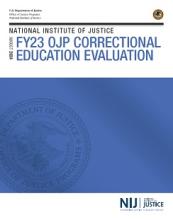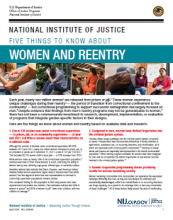Justice system reform
A Turning Point in Mass Incarceration? Local Imprisonment Trajectories and Decarceration under California's Realignment
Criminal Investigative Failures: A Network Analysis
Understanding the Needs of Victims of Criminal Justice System-Related Harms
Augmenting, Analyzing, and Archiving Criminal Trajectories in Four Birth Cohorts from the Project on Human Development in Chicago Neighborhoods, 1995-2023
Incentivized Informants and Wrongful Convictions: Understanding the Risks and Mitigating the Effects
The Ecology of Resilience: Examining Impacts of Service Engagement, Facility Safety, and Trauma History on Positive Life Trajectories in Justice-Involved Youth
FY23 OJP Correctional Education Evaluation Package
Transforming Correctional Culture and Climate
Five Things to Know About Women and Reentry
Webinar Transcript: NIJ FY 2024 Research and Evaluation on Youth Justice Topics
This webinar will provide an overview of the NIJ FY 2024 Research and Evaluation on Youth Justice Topics solicitation. In collaboration with the Office of Juvenile Justice and Delinquency Prevention, NIJ seeks applications for research and evaluation projects that inform policy and practice in the field of...




